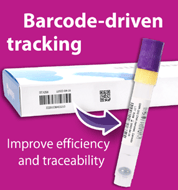2021-12-06
From donor to data, samples begin their journey to powering microbiome research when the donor captures their microbiome under the specific conditions of their health, diet and exposures. After this, the sample will be delivered to laboratory facilities to integrate with potentially hundreds or thousands of other donor samples and the data generated from processing these samples analyzed.
Along this journey, there is an inherent risk for samples to be compromised by either losing their label or the label being misinterpreted at any touchpoint between the sample and staff. For example, samples input to any analysis with mismatched sequencing results or metadata could potentially skew the results of an entire study towards an incorrect conclusion.
As microbiome studies begin to scale to include more locations, large populations and longitudinal sampling it becomes increasingly important to ensure samples can be accurately traced throughout the entire process and matched with corresponding donor information and samples.
With high volumes of samples coming from multiple sites, laboratory inventory management systems (LIMS) were developed to manage samples and their data efficiently. Although, these systems require information be entered into electronic records and, while manual data entry may be possible, the task becomes unfeasible as the volume of samples and information in a study scale; as does the risk of human error to input a greater number of entries into a LIMS.
Hand labeling sample methods that create even a small percent error can lead to issues downstream in high throughput studies. While simple and affordable to write labels, the human error of mislabeling or misreading these labels is a controllable risk in research that undermines study power and potentially exposes donor information unnecessarily to staff.
As the number of steps for samples to reach their destination grow so does the risk of hand labels as there are more steps requiring label interpretation. Accessible barcoding and scanning technology allows for standardized high accuracy and efficiency sample logistics for microbiome projects to ensure lower risk of human error, improved efficiency, and better donor confidentiality.
How are barcodes used in microbiome studies?
Barcodes are unique identifying labels that can be read electronically to recall stored information. Microbiome samples that are labelled with barcodes can be scanned to quickly and accurately retrieve necessary sample information for lab or delivery staff. Used in nearly every process from inventory tracking, laboratory processing, and data reporting, barcodes offer a convenient way to processing information. As microbiome studies begin to scale into large-population high throughput studies it is increasingly important researchers can efficiently process their samples with the lowest risk to samples. Here we discuss three critical reasons for barcoding microbiome samples.
- Reduces the risk of human errors
Barcodes reduce the chance a sample being mislabelled or misread by using a unique identification code to store information about each sample. Recalling information via scanner at any point with higher accuracy than manual reading, barcodes offer a solution to control risk in microbiome studies. - Automation and high throughput efficiency
New technologies that automate steps and allow high-throughput processing of samples improve efficiency using barcoding to electronically interpret all samples. While manually labeling each sample is a tedious task that introduces unnecessary risk and slows down workflows, barcoding offers a fast, efficient method that supports high volumes of samples. Similarly, multiomic research that incorporates multiple assays and sample types make barcoding a necessity to processing samples in multiple workflows while maintaining integrity of metadata databanks. - Complete confidentiality
Whether the donor is a patient or a customer, their information should be securely stored and only be distributed as needed to generate study results. Maintaining strict confidentiality is difficult if samples require donor information be labeled by hand or attached with a preprinted label. Barcodes resolve this issue by generating a unique code that can only be read by scanner allowing complete confidentiality of donor information.

OMNIgene® unique 14-digit barcode
Identifying these benefits the scientists at DNA Genotek developed the OMNIgene® line of collection devices with a unique 14 digit barcode capable of identifying the sample at any point in microbiome study. Full sample traceability ensures samples and donor information will not be lost along the way and lowers risk data reporting, while donor confidentially is maintained by securely storing their information electronically. Bring automation and high throughput processing to your workflows with collection devices created to reduce the risks of human error via prelabelled barcodes universally accepted by most laboratory inventory management systems.
If you are interested in learning more about DNA Genotek’s fully barcoded products for gut microbiome, oral microbiome, vaginal microbiome, skin microbiome and gut metabolome, you can send us an email at info@dnagenotek.com or visit our website www.dnagenotek.com for more information. You can also click the banner below to request free samples of our microbiome and metabolome collection kits.



